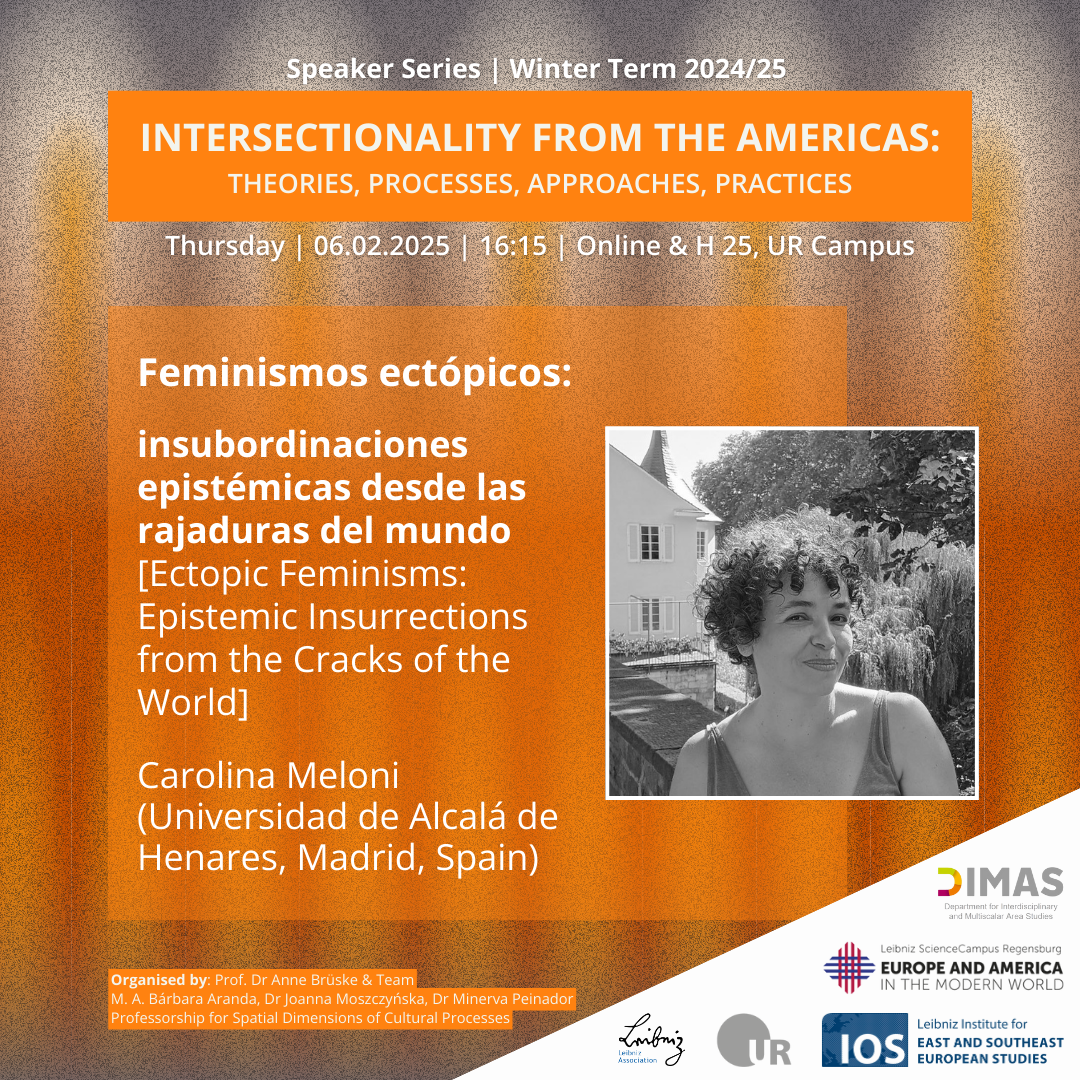Speaker Series Intersectionality from the Americas | Carolina Meloni (Madrid) | Feminismos ectópicos: insubordinaciones epistémicas desde las rajaduras del mundo
When? Thursday, 6 February 2025, 16:15
Where? H 25, UR Campus & Online via Zoom
This talk forms part of the speaker series Intersectionality from the Americas: Theories, Processes, Approaches, Practices, taking place throughout the winter semester 2024/25. Supported by the ScienceCampus and organised by Anne Brüske with Minerva Peinador, Bárbara Aranda and Joanna Moszczyńska of DIMAS, this series will feature talks, a workshop and an artistic performance. Find the flyer about the speaker series here. More details about the series can be found here.
The talk on 6 February will be held in Spanish. Title and abstract in English are included below. The main content of the presentation will be translated into English. The discussion will be held in Spanish and English.
“Feminismos ectópicos: insubordinaciones epistémicas desde las rajaduras del mundo” [Ectopic Feminisms: Epistemic Insubordinations from the Cracks of the World]
Abstract in the Language of the presentation:
Abordaremos en esta conferencia las genealogías del feminismo como si de una cartografía se tratara. Para ello, hablaremos de mapas y mundos y no tanto de un movimiento monolítico, estructurado en olas y gestas heroicas. En este sentido, retomo el término médico de “ectópico” para recuperar distintas genealogías feministas que, si bien se sitúan en la estela de las utopías políticas, aunque parezca contradictorio, se van a contraponer de manera frontal y directa a la tradición utópica clásica del propio feminismo. Frente a la tradición del feminismo ilustrado y civilizatorio, vamos a recuperar la tradición de feminismos ignotos, ectópicos, situados al borde mismo de toda cartografía hegemónica. Feminismos que portan en su seno otras utopías, que son múltiples y diversas, que nos sitúan en la estela de otras genealogías, en una genealogía-otra. En otros paisajes y horizontes. Porque «no hay una genealogía feminista, [nos dice Galindo,] sino muchas genealogías diferentes» (Galindo, M., 2021, p. 80) y toda memoria feminista que se pretenda única, homogénea y universal está en clara sintonía con los discursos y dispositivos de poder contra los que pretende luchar. Las ectopías feministas tienen que ver con esas geometrías distintas, con territorios vivientes de desobediencia dentro de los mapas conceptuales, filosóficos y políticos dibujados por un occidente depredador. Hacer un recorrido por las mismas supone, por tanto, desescribir relatos, imaginar otros paisajes, rememorar otras luchas y desfundamentar mitos conceptuales que hemos aceptado de manera acrítica.
Abstract in English:
In this conference, we will approach the genealogies of feminism as if it were a cartography. To this end, we will speak of maps and worlds rather than of a monolithic movement structured in waves and heroic deeds. In this sense, I will use the medical term "ectopic" to recover different feminist genealogies that, although they are situated in the wake of political utopias, will be opposed in a frontal and direct way to the classical utopian tradition of feminism itself, even if it may seem contradictory. In contrast to the tradition of enlightened and civilizing feminism, we will recover the tradition of unknown, ectopic feminisms, located at the edge of any hegemonic cartography. Feminisms that contain other utopias, that are multiple and diverse, that place us in the wake of other genealogies, in a other-genealogy. In other landscapes and horizons. Because "there is not one feminist genealogy, [Galindo tells us], but many different genealogies" (Galindo, M., 2021, p. 80), and any feminist memory that pretends to be unique, homogeneous and universal is clearly in tune with the discourses and apparatuses of power that it pretends to fight. Feminist ectopias have to do with these different geometries, with living territories of disobedience within the conceptual, philosophical and political maps drawn by a predatory West. To travel through them, then, is to unwrite narratives, to imagine other landscapes, to remember other struggles, and to dispel conceptual myths that we have accepted uncritically.
Bio:
Carolina Meloni es Doctora en Filosofía y Profesora Titular en la Universidad de Alcalá de Hernares (Madrid). Sus líneas de investigación son la filosofía política contemporánea, el pensamiento feminista y las doctrinas del género, la ética y la teoría crítica de los medios de comunicación. Ha colaborado con diversos artículos en revistas especializadas en filosofía, así como en seminarios, proyectos de investigación, cursos, congresos y másters, tanto en España, Latinoamérica como en Francia. Entre sus publicaciones más recientes ha coordinado el capítulo de Sexualidades en la Enciclopedia crítica del género(Arpa, 2023), una obra que reúne el trabajo de más de cincuenta especialistas en estudios de género y teoría queer y es autora de los libros Feminismos fronterizos (Madrid, 2021) y Sueño y revolución (Madrid, 2021).
Carolina Meloni holds a PhD in Philosophy and is a Professor at the University of Alcalá de Henares (Madrid). Her research interests include contemporary political philosophy, feminist thought and gender studies, ethics, and critical media theory. She has collaborated on several articles in specialized philosophical journals, as well as seminars, research projects, courses, conferences and master's programs in Spain, Latin America and France. Among her most recent publications, she has coordinated the chapter on sexualities in the Critical Encyclopedia of Gender (Arpa, 2023), a work that brings together the work of more than fifty specialists in gender studies and queer theory, and is the author of the books Frontier Feminisms (Madrid, 2021) and Dream and Revolution (Madrid, 2021).

